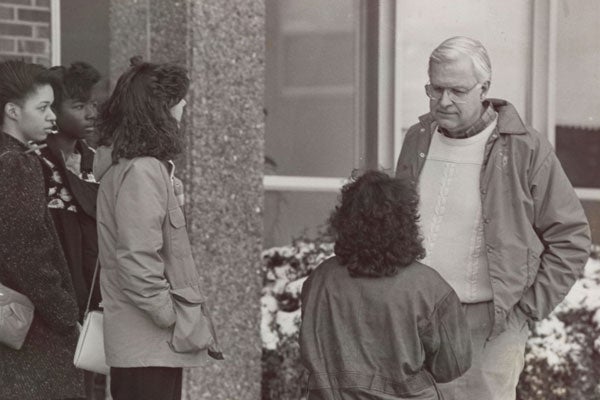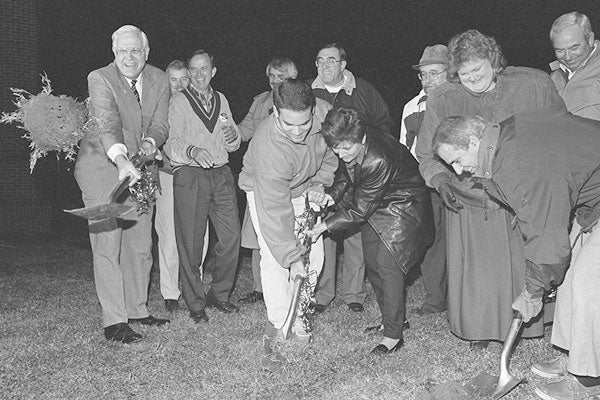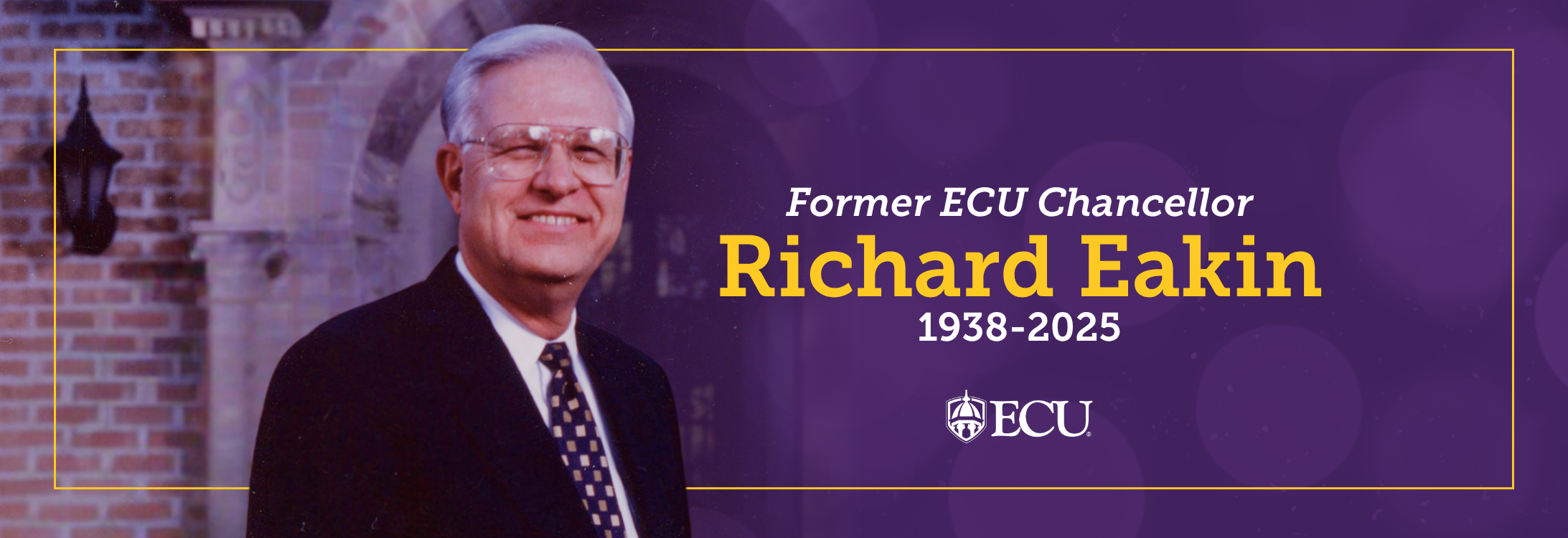Former Chancellor Richard Eakin, who led ECU from 1987-2001, died Monday
Indoors or out, Richard Eakin was easy to spot — about six-and-a-half feet tall with a shock of white hair, a big smile and hearty laugh. He would often approach strangers with his hand out saying, “Hi, I’m Dick Eakin.”

Chancellor Richard Eakin speaks with students following a Feb. 25, 1989 fire at Clement Residence Hall.
Eakin, who served as East Carolina University chancellor from 1987 to 2001, died Monday. He was 86.
“Chancellor Eakin was a dedicated and accomplished Pirate who oversaw the establishment of important facilities for students, achieved doctoral status for the university and guided the community through the devastation and recovery from Hurricane Floyd,” said ECU Chancellor Philip Rogers. “He will be remembered for his warmth and compassion by those who knew him. Rebekah and I join all of Pirate Nation in celebrating his life and his devoted service to East Carolina University.”
John Tucker, a professor of history at ECU and former university historian, said, “He was as down-to-earth and really approachable as I’ve seen on campus in my lifetime.” He noted that Eakin eschewed an entourage when walking to and from meetings. “Eakin walked by himself. He didn’t try to insulate himself from the campus.”
Eakin’s 14 years at the helm of ECU were some of the school’s most productive. During his tenure, the student body grew by nearly a third, to 18,000 students, with incoming freshman boasting test scores at all-time highs, and he rightly forecasted growth of student enrollment in the decade ahead to as much as 27,000. At the same time, ECU’s research accomplishments were recognized in its Carnegie classification as a doctoral/research institution, and in 1999, the School of Medicine was named after the Brody family, major benefactors to the university.
“Dick was a class act,” said Hyman Brody. “He brought stability and solid leadership to ECU and was a person of character. He displayed good values and principles, which guided his actions. He made solid judgments, showed courage in standing up for his beliefs and what was right for ECU. Dick had a strong sense of responsibility and understood what the university meant to the region and deeply cared about the school, our state and its communities. A great listener with a big smile, Dick was always kind and empathetic. He made a big difference at ECU during his tenure. Dick will be missed.”
Under Eakin’s leadership, the campus became digitally integrated with fiber-optic cable, linking ECU’s faculty, staff and students with North Carolina’s emerging “information highway.”
“That set us up for becoming a leader in distance education and preparing us for a potential disaster like the pandemic” when learning moved online, said Tucker. “There were other institutions that were not as forward minded.”

Former Chancellor Richard Eakin, left, participates in the November 1993 groundbreaking of the Joyner Library addition.
In 1997, Eakin’s administration orchestrated the first “Founders Day” celebration, commemorating ECU’s 90th anniversary and “to constantly remind ourselves of the people who have gone before us and who have achieved success,” he said. Eakin also led the establishment of the EC Scholars program, now the Brinkley-Lane Scholars Program, ECU’s most prestigious undergraduate scholarship. During Eakin’s final year as chancellor, research grants and contracts reached a record high.
As part of North Carolina’s higher education facilities bond passed in 2000, Eakin led ECU’s drive to secure $190.6 million for the construction of a new building housing the College of Nursing, College of Allied Health Sciences and Laupus Library on the Health Sciences Campus. The bond also funded construction of what became the largest building on the main campus, the Science and Technology Building.
Additions and renovations to the Flanagan, Belk and Rivers buildings were also funded, as well as the completion of Todd Dining Hall on College Hill. Eakin’s administration oversaw the construction of the new Student Recreation Center, a major renovation of Joyner Library and the construction of the Sonic Plaza outside the library.
In 2020, the recreation center was renamed the Richard R. and JoAnn M. Eakin Student Recreation Center. Eakin was unable to attend the renaming ceremony, but beforehand said: “I was really involved with the recreation center from the very beginning. It’s always been very near and dear to my heart. My wife and I are absolutely thrilled with this recognition. We have a great deal of love for the East Carolina family, and we’re deeply touched by the university returning that love in this most tangible way.”
Eakin led the university’s first major comprehensive capital campaign, the Shared Visions Campaign, which raised $10 million for the expansion of Dowdy-Ficklen Stadium among other projects. Joyner Library’s holdings surpassed the million-volume threshold, and grants and contracts rose to $40 million a year. Under Eakin’s watch, ECU joined Conference USA in the 2001-2002 season.
After stepping down as chancellor, Eakin served ECU as interim director of the alumni association and as the founding dean of the Honors College.
“He didn’t stay in that position long, but he did establish a high level of leadership and integrity,” Tucker said.
In 2011, Eakin received the inaugural James R. Talton Jr. Leadership Award for his service to the university.
Eakin was born Aug. 6, 1938, in New Castle, Pennsylvania and received his bachelor’s degree in mathematics and physics from Geneva College, where he played basketball. He earned his master’s and doctorate in mathematics from Washington State University in 1962 and 1964, respectively. Eakin started his career on the mathematics faculty at Bowling Green State University. He was a professor and administrator there when he was named ECU’s chancellor.
In college, Eakin knew he would become a high school math teacher and basketball coach. His career path changed, but he never lost his appreciation for teaching. In the Feb. 12, 1989, “Tar Heel of the Week” feature in the Raleigh News & Observer, he summed up his thoughts this way: “The thing about teaching that’s so much fun is that you realize … you as one individual can, in the course of a year, have an impact on so many people. You have a feeling … that as a teacher what you are doing is going to live a long time.”
Eakin is survived by his wife, Jo, children Matthew Glenn Eakin and Maridy Lynn Knight, two grandchildren and numerous nephews and nieces. In accordance with his wishes, there will be no memorial services. Contributions in his memory may be directed to the ECU Honors College.
Read more about Eakin and see more photos in this 2013 story about him receiving the first Honors College medallion.
